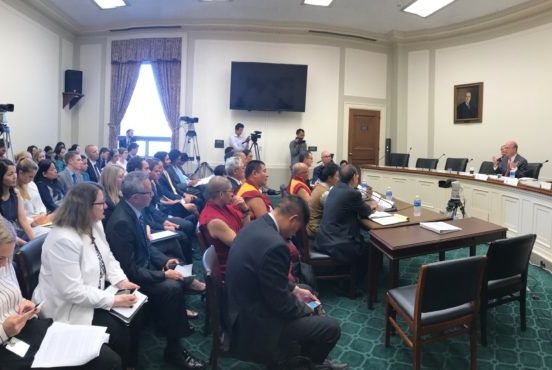 Dharamshala — The US Tom Lantos Human Rights Commission held a hearing on Religious Freedom in Tibet on July 12, coinciding with the 2nd anniversary of well known leader, Tulku Tenzin Delek Rinpoche's death while being held in Chinese prison.
Dharamshala — The US Tom Lantos Human Rights Commission held a hearing on Religious Freedom in Tibet on July 12, coinciding with the 2nd anniversary of well known leader, Tulku Tenzin Delek Rinpoche's death while being held in Chinese prison.
Co-Chairs of the Commission, Congressmen Jim McGovern and Randy Hultgren, chaired the hearing which was attended by several notable guests who testified before the committee, including: Dr. Tenzin Dorjee, the first Tibetan-American Commissioner of the US Commission of International Religious Freedom, Arjia Rinpoche; the former Abbot of Kumbum Monastery and an eyewitness to the selection of the Panchen Lama; Nyima Lhamo, niece of the late Tulku Tenzin Delek Rinpoche; and Todd Stein, an expert on Tibetan issues and former staff member of the State Department.
In their testimonies, the speakers noted the state of religious freedom within Tibet, mentioning the destruction of Larung Gar, self-immolations, prisoners of conscience and other issues.
Dr. Tenzin Dorjee said, "Rigorous study and practice are very important to the Nalanda Tradition of Tibetan Buddhism. The Chinese government seeks to strike at the heart of Tibetan Buddhism by attacking the Tibetan religious and educational institute of Larung Gar, the largest Tibetan Buddhist institute in the world which is located in Sichuan Province. Larung Gar is home to more than 10,000 monks, nuns, laypeople, and students of Buddhism from all over the world. In July 2016, the Chinese government launched a sweeping operation to demolish significant parts of this institute.
"The Chinese government cracks down on anyone suspected of so-called separatist activities and for participating in the “Dalai clique.” Monks and nuns who refuse to denounce the Dalai Lama or do not pledge loyalty to Beijing have been expelled from their monasteries, imprisoned, and tortured."
Arjia Rinpoche also testified, stating, "The [Chinese] government wants to present a different image to the outside world. They organize religious figures from these institutes and send them abroad on lecture tours to help create a false image of 'religious freedom.' At home, the khenpos and masters are afraid to speak against the government. All they can do is beg the monks to practice patience and endure the oppression and humiliation. In short, the Chinese government, while it propagates 'religious freedom' abroad, at home it practices strict control over all religious affairs, and is a typical example of 'strict inside and loose outside' policy."
Nyima Lhamo also spoke, describing the suspicious conditions surrounding her uncle's death and finally saying, "I feel very lucky and happy to be speaking in front of all of you today. An opportunity like this, to speak freely, is a long cherished aspiration of every Tibetan inside Tibet. When I was in Tibet, whenever I heard news of the United States’ support for Tibet and His Holiness the Dalai Lama, it brought me hope. With this hope, I fled Tibet leaving my family, including my six-year old daughter behind. I know my speaking here may jeopardize my family's safety in Tibet. Despite that, I am taking all the risks and speaking in front of you today with sincere hope, and appeal to the international community to prevail against the Chinese government to carry out a thorough investigation into the circumstances leading to the death of my uncle, Tenzin Delek Rinpoche."
The hearing was held in the Foreign Affairs Committee conference room and was attended by many staffers of the members of the Commission and the State Department. Office of Tibet, International Campaign for Tibet and Students for Free Tibet jointly helped coordinate the hearing.


![Tibet has a rich history as a sovereign nation until the 1950s when it was invaded by China. [Photo: File]](/images/stories/Pics-2024/March/Tibet-Nation-1940s.jpg#joomlaImage://local-images/stories/Pics-2024/March/Tibet-Nation-1940s.jpg?width=1489&height=878)















